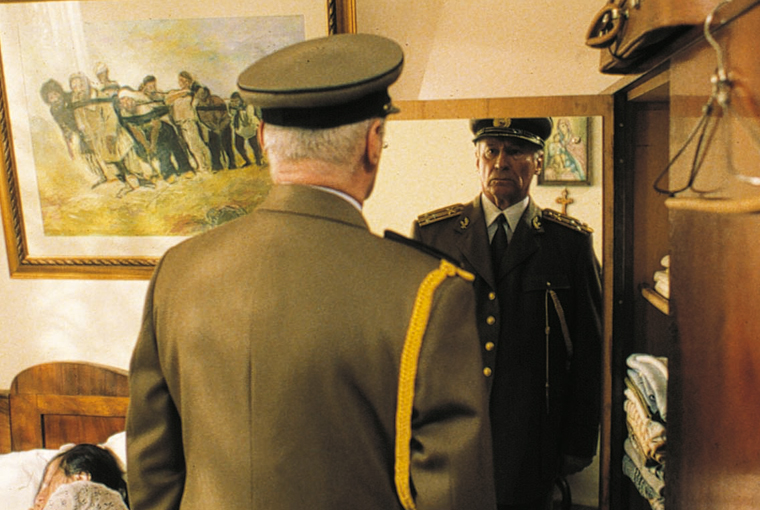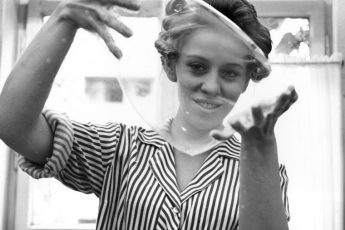An Early Moment of the Romanian New Wave
Lucian Pintilie’s Niki and Flo (Niki Ardelean, colonel în rezervă, 2003)
Vol. 112 (February 2021) by Lucian Tion
Niki and Flo is undoubtedly an important film. Not because it is on par with the notable successes of the Romanian New Wave, such as 12:08 East of Bucharest or 4 Months, 3 Weeks and 2 Days; but because, through the flawed delivery of an experimental script, it prefigures those successes. Unfortunately, it stops short of itself adopting to celluloid the visual sensibility that rightly made the Romanian movement famous in the 2000s.
Directed by Lucian Pintilie, the celebrated luminary of what some have termed the “dissident” spirit of the socialist era, and a representative of “old guard” Romanian cinema, Niki and Flo was written by purebred New Wavers Cristi Puiu and Răzvan Rădulescu, who would go on, only three years later, to write and direct The Death of Mr. Lăzărescu, their break-through on the international stage. For reasons this assortment entailed, the film promised to be an interesting project, meant to bring together the old and the young of an age in which the Wave was struggling to come into existence. Instead, the production proved that the conflicts caused by the generation gap, even in the case of a film studded with sonorous names, can sometimes do more harm than good.
What makes Niki and Flo only half-baked? On the one hand, the inexperienced Puiu and Rădulescu writing team, who are only at their second collaboration after Stuff and Dough (2001), don’t seem able to infuse their characters with enough credibility at this early stage in their careers. On the other hand, and more importantly, the film suffers from Pinitile’s over-experienced and uncompromising, that is, authoritarian, directorial hand.
What happens in the film? A retired army colonel, Niki Ardelean (Victor Rebengiuc), is embroiled in an ideological conflict with the father of his son-in-law. Seeing his daughter leave for the United States, and having already lost a younger son due to a reckless electrocution accident (the film opens with the wake after the funeral), Niki becomes impassionate with the role of the army in Romanian history, one of the few truths he can cling onto in his rapidly changing surroundings. However, this is precisely the truth that is challenged by his in-law, Flo (Răzvan Vasilescu), a neurotic conspiracy theorist who naively believes that masons rule the world and decide the fate of history, the one of the army included. In an act designed to show the powerlessness that the older generation feels in the face of an arrogant and domineering minority bound on rewriting history, Niki, suffering from humiliation and frustration at the hand of his relative, kills Flo in a surprising final act. Aside from this conflict, which adroitly captures the feel of a country lost in the throes of transition – and which the two screenwriters skillfully identify and dramaturgically enrich – the film also focuses on the desperate economic conditions of the 1990s, a period when poverty forced many Romanians to emigrate, leaving their parents behind. This, in turn, created further dramas that the New Wave successfully exploited later (e.g. Șerban’s If I Want to Whistle, I Whistle from 2010 and Gulea’s 2013 I Am an Old Communist Hag).
As in The Oak (1992), and even in his earlier and much-acclaimed Reenactment (1967), Pintilie is concerned with showing not only this poverty, but the primitivism of Romanian society in general. In both films, the director, an émigré who left Romania for France in 1973 to return after the collapse of socialism, draws intriguing portraits of collective characters, who are also made vibrant through symbolism. Whether it’s a group of miners who assail a broken-down train in The Oak, or the drunken crowd whose unruly screams flood the screen in the last scene of Reenactment, Pintilie is deeply affected by the chaotic power of the masses, which he condemns in his subliminally pejorative commentary. Pintilie’s accusatory camera and his featuring of disorderly characters who seem to tick to inner clocks which society cannot control, paint a picture of a country in chaos whose only salvation lies in a dictatorial voice (used for doing good rather than harm, we assume), such as that of the doctor-protagonist (Răzvan Vasilescu) in the Oak. Imposing himself over all the other characters in the film, Vasilescu’s character ultimately gets to dominate over the disorderliness of a surrounding environment which he cannot otherwise control.
In Niki and Flo we witness a reversal of this situation. Although, as in The Oak, authoritative characters replace the absent rule of law by ruling over society by themselves, in Niki and Flo, Vasilescu (symptomatically, the same autocrat from The Oak now in the role of Flo), becomes a victim of his own autocracy. He does this, of course, by offending those who have obediently lived their lives in the silence inspired (or required) by their roles in society. It is also symptomatic that Flo’s tyranny is arrested by Niki. That Niki is played by Victor Rebengiuc, a popular actor who in the early 1960s was cast in the very heroic roles of army commanders (notably The Tempest, 1960) that he here reprises (and tremulously upholds) from another perspective, is a fortunate homage paid to Romanian cinema history.1
Even if there is a reversal at play in Niki and Flo, this does not spell the end to intra-societal tyranny in either the pre- or post-1989 Romanian societies, both of which Pintilie, in moralistic tones, virulently criticizes. And it is not Pintilie’s inveterate pessimism that makes the project limp, either. It is the contradictory combination of two opposing tendencies. On the one hand, the purpose of the Puiu/Rădulescu team—as in the later The Death of Mr. Lăzărescu—was to show that the advance of capitalist ideology trampling over old values made the lives of those living before the 1989 revolution appear wasted. Faced with its own pointlessness, the old generation found itself pushed in a corner of isolation and impending death. If this is still visible in the film, Pintilie’s project, contrastingly, shows the continuing chaos and carnivalesque elements that rule over personal relationships, defining, in this way, the overall character and normative values of a society in which the meek have to submit to the powerful. As in the veteran director’s above-mentioned films, but also in his iconic Carnival Scenes (banned by the regime in 1981),2 this is the explanation of certain over-long scenes, in this case of Niki watching the tape of his daughter’s wedding. Although the screenwriters’ goal was to show the way in which Flo (who is behind the camera and whose authoritative voice we hear commenting on the entire home movie) takes over Niki’s life, Pintilie is too absorbed with the buffoonery of the chaotic spectacle that lies at his feet. The scenes in which the bride is stolen, and in which Niki’s daughter (Dorina Chiriac) runs around and ends up hiding in a wardrobe to change her dress (bearing her breasts in front of her father-in-law’s camera) attest to the grotesque that Pintilie condemns in Niki and Flo and his earlier productions.
As inexperienced as it might have been at this stage, the hand of the New Wave scriptwriters is steady, portraying the two characters in conflict over ideologies during the postsocialist transition realistically. Pintilie’s voice, on the other hand, is as moralizing as that of Flo, whom the director himself accuses for being overbearing. In fact, the film in Pintilie’s hand becomes a story about Flo, while in the screenwriters’ hands it had originally been about Niki. That is the reason the project becomes disjointed, continuously searching for a register that ends up being neither the one made famous by Pintilie’s deprecatory view of the carnivalesque, nor that of the stark realism definitively marked by Puiu’s and Rădulescu’s style.
Proof of this oscillation also comes from a late scene in the film in which Pintilie edits images of Niki cutting his toenails over a TV reportage, which shows the celebration of the Army Day in the background. The scene is supposed to be climatic. Because of his disgust at society’s attitude towards the army and the disrespect this entails for his own person, Niki resolves, during these crucial moments, to carry his plan through, namely, to assassinate Flo. However, Pintilie’s camera achieves the opposite. In a tendency to comment on his visual materials, the director is resolved to disparage the memory of what had originally been a Communist-designated celebration by showing its relative lack of importance in the new capitalist context. Because of the repellent close-ups of Niki’s toes, we judge that Pintilie equally shares the generalized indifference for the army we overhear on the TV set, and, considering the director’s own biography, the repulsion for the socialist/postsocialist nation. As personal as this might be for Pintilie, it detracts from the film’s realistic power, making Niki’s murder of Flo appear as lacking in motivation.
In need of a clearer focus, and unable to choose between realism and moralizing parable, the film does not deliver. For that reason, it is symptomatic of the difficulty that the “old guard” and the young filmmaking generations had working together at this critical juncture in time, when the New Wave was about to make its mark on Romanian film history. Niki and Flo turned out to be the last feature film Pintilie directed before his death in 2018 at 84, and ironically, it also turned out to seal the fate of the old filmmaking generation working under socialism. As in an act of poetic justice, the characters of Niki and Flo provide an eerie synthesis personifying the fate of Pintilie himself, in that the film demonstrates the director’s incapacity to adapt to the postsocialist environment and compete with the younger generation, which would go on to make the New Wave famous. As was the case with Mircea Daneliuc and Dan Pița, the other enfants terribles of the socialist period, Pintilie’s postsocialist work pales in contrast to that of the New Wavers, showing that the old generation’s symbolic cinema and the gritty realism of the New Wave don’t go together.
If Pintilie remains an icon of the socialist era, this is mainly because his Reenactment helped cement the realism later borrowed by the New Wavers. But Reenactment, just as Pintilie’s other works including Carnival Scenes, is heavily imbued with symbolism, a style which feels heavy-handed when combined with realism. That is why Niki and Flo, a heir to the director’s early works as much as an early staple of the “Puiuland” filmmaking style,3 has trouble finding its voice. It thus reflects the hesitation that the New Wave went through in its early days. Finally, the moralizing gesture that Reenactment as well as The Oak enact on a poverty-stricken Romania and its population’s behavioral practices, makes Pintilie’s style suffer from being preachy. Niki and Flo demonstrates that this style doesn’t agree with the less didactic stance on Romanian society adopted by Puiu and Rădulescu. In that way, it is almost fortunate that the project turned out to be a failure, because, under these circumstances, it showed the younger writer-directors the path that would lead to the (purer) realism of the New Wave.
References
- 1.Another memorable part for Rebengiuc is that of Ion I. Ion in Netzer’s Medal of Honor, produced in the same year as Niki and Flo, 2003, in which the actor also plays a former WWII combatant.
- 2.Pintilie returned temporarily to his native Romania from France in order to make this film.
- 3.The term was popularized by Alex Leo-Șerban, the late Romanian critic who identified Puiu’s style as a particular mark of the New Wave.




Leave a Comment